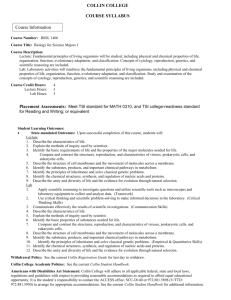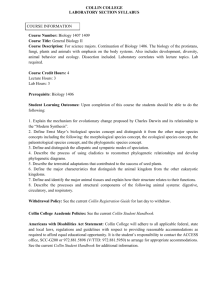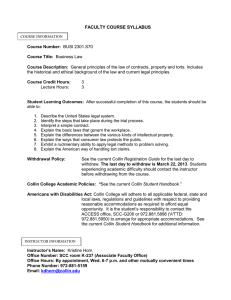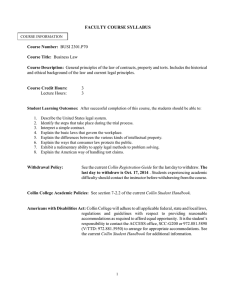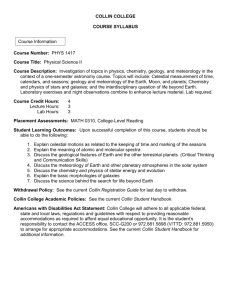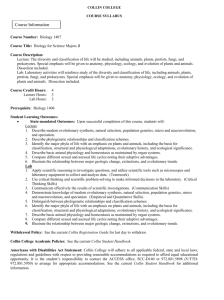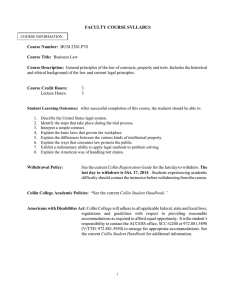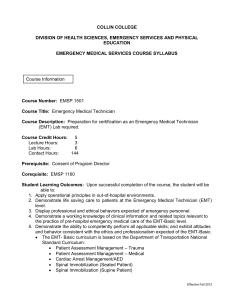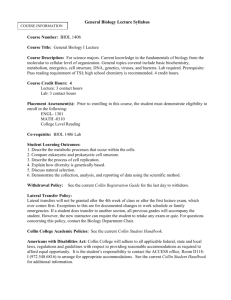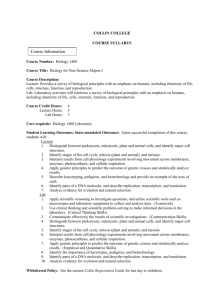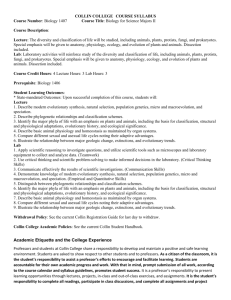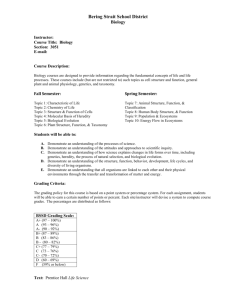History 1301, American History to 1877
advertisement
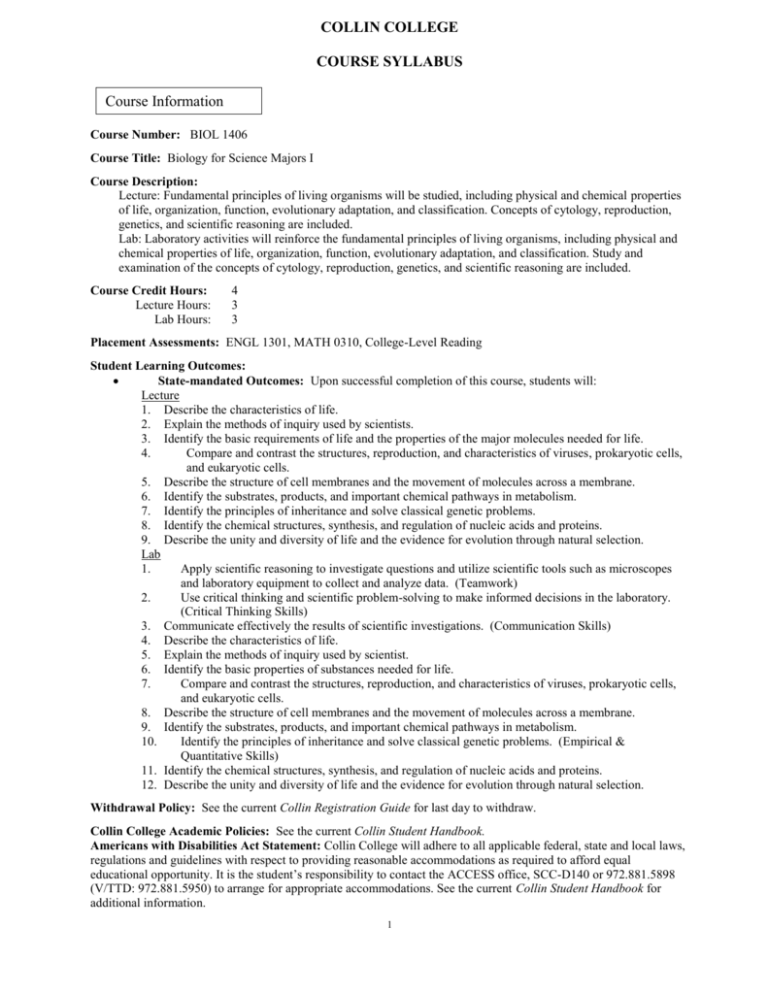
COLLIN COLLEGE COURSE SYLLABUS Course Information Course Number: BIOL 1406 Course Title: Biology for Science Majors I Course Description: Lecture: Fundamental principles of living organisms will be studied, including physical and chemical properties of life, organization, function, evolutionary adaptation, and classification. Concepts of cytology, reproduction, genetics, and scientific reasoning are included. Lab: Laboratory activities will reinforce the fundamental principles of living organisms, including physical and chemical properties of life, organization, function, evolutionary adaptation, and classification. Study and examination of the concepts of cytology, reproduction, genetics, and scientific reasoning are included. Course Credit Hours: Lecture Hours: Lab Hours: 4 3 3 Placement Assessments: ENGL 1301, MATH 0310, College-Level Reading Student Learning Outcomes: State-mandated Outcomes: Upon successful completion of this course, students will: Lecture 1. Describe the characteristics of life. 2. Explain the methods of inquiry used by scientists. 3. Identify the basic requirements of life and the properties of the major molecules needed for life. 4. Compare and contrast the structures, reproduction, and characteristics of viruses, prokaryotic cells, and eukaryotic cells. 5. Describe the structure of cell membranes and the movement of molecules across a membrane. 6. Identify the substrates, products, and important chemical pathways in metabolism. 7. Identify the principles of inheritance and solve classical genetic problems. 8. Identify the chemical structures, synthesis, and regulation of nucleic acids and proteins. 9. Describe the unity and diversity of life and the evidence for evolution through natural selection. Lab 1. Apply scientific reasoning to investigate questions and utilize scientific tools such as microscopes and laboratory equipment to collect and analyze data. (Teamwork) 2. Use critical thinking and scientific problem-solving to make informed decisions in the laboratory. (Critical Thinking Skills) 3. Communicate effectively the results of scientific investigations. (Communication Skills) 4. Describe the characteristics of life. 5. Explain the methods of inquiry used by scientist. 6. Identify the basic properties of substances needed for life. 7. Compare and contrast the structures, reproduction, and characteristics of viruses, prokaryotic cells, and eukaryotic cells. 8. Describe the structure of cell membranes and the movement of molecules across a membrane. 9. Identify the substrates, products, and important chemical pathways in metabolism. 10. Identify the principles of inheritance and solve classical genetic problems. (Empirical & Quantitative Skills) 11. Identify the chemical structures, synthesis, and regulation of nucleic acids and proteins. 12. Describe the unity and diversity of life and the evidence for evolution through natural selection. Withdrawal Policy: See the current Collin Registration Guide for last day to withdraw. Collin College Academic Policies: See the current Collin Student Handbook. Americans with Disabilities Act Statement: Collin College will adhere to all applicable federal, state and local laws, regulations and guidelines with respect to providing reasonable accommodations as required to afford equal educational opportunity. It is the student’s responsibility to contact the ACCESS office, SCC-D140 or 972.881.5898 (V/TTD: 972.881.5950) to arrange for appropriate accommodations. See the current Collin Student Handbook for additional information. 1 INSTRUCTOR’S INFORMATION Instructor’s Name: Sukanya Subramanian Office Number: F213 Office Hours: MTWR 12.10 - 1.00pm, 3.00 - 3.10pm or you can make an appointment Phone Number: 972 377 1583 Email: ssubramanian@collin.edu CLASS INFORMATION Section Number: 1406 1P2, 1406P2L Meeting Times: 10.10 -12.10 pm Lecture, 1 – 3 pm Lab Meeting Location: F249 Lecture, F227 Lab Course Resources: : Biology, 9th ed., Campbell/1406 custom edition for Collin along with masteringbio (also read: Tips on How to Succeed In This Course on web page) Online Biology Laboratory Manual - http://iws.collin.edu/biopage Supplies: Loose-leaf notebook to keep lab reports and handouts Labcoat or apron and latex gloves, if desired, for some labs Goggles are required during lab. These can be purchased from the bookstore. Attendance Policy: Regular attendance is expected. Individual conflicts with this policy are to be discussed with the instructor. Laboratory attendance is mandatory. Students who stop attending class and do not officially withdraw from the course will be assigned a grade of “F”. Method of Evaluation: Overall Course Grade: Lecture 75%, Lab 25% Lecture: 5 major exams (40 marks each) Extra Credit, Quizzes , Homework assignments ,Online assignments as determined by instructor, No Make- up Exams* or quizzes, *Make-up exams may only be granted in the event of extenuating circumstances (e.g. hospitalization of the student, death in the family, etc.) that are supported by documentation. The instructor reserves the right to make the determination of whether a particular situation merits a make-up exam. Please contact the instructor as soon as possible if a situation arises that prevents you from attending class on a scheduled exam date. If you anticipate a problem that may impact a future exam, please get in touch with the instructor to discuss the situation as soon as you know of a potential conflict. 2 BIOLOGY 1406 - GENERAL BIOLOGY I LECTURE TENTATIVE COURSE CALENDAR – SUMMER I WEEK LECTURE TOPICS CHAPTER 1 Science of Biology 1 Basic Chemistry 2 Water 3 Carbon Chemistry 4 ***Census Day 6/12*** 2 Macromolecules 5 Exam I The Cell 6 Membrane Structure and Function 7 Cell Communication 11 11 Exam II Metabolism 3 8 Cellular Respiration 9 Photosynthesis 10 Exam III Cell Division 12, 13 ***Last Day to Withdraw 6/23*** 4 Mendelian Inheritance 14 Human Genetics 15 Exam IV 5 DNA Structure & Replication 16 Protein Synthesis 17 Microbial Genetics 18 Eukaryotic Gene Regulation 19 DNA Technology 20 Final on Thursday 7/09/2015 3
